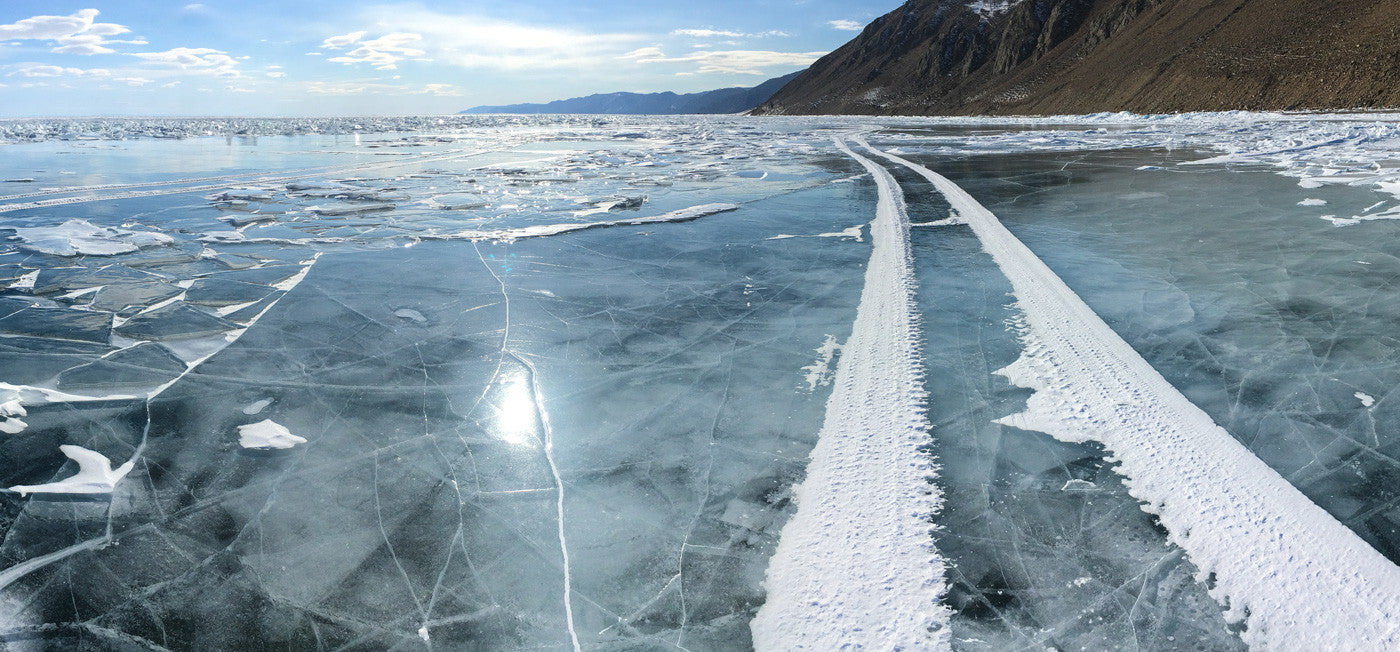
Cycling Frozen Lake Baikal
Jonny Mutch cycles the world's deepest lake. As told to Olivia Lee.
The Russian fishermen howled with laughter as I explained my plan to cycle the western shores of Siberia’s Lake Baikal, from Severobaikalsk to Listvyanka, over 650 kilometres of ice. They told me it was impossible, that I should go home, that no one would rescue me if something went wrong. I looked across the frozen lake stretching in front of us, the wind whipping the snow into fierce flurries. They were probably right. But I couldn’t go home yet — not without at least trying.
Like most of my ideas, this was borne from a few too many espressos, a whole lot of daydreaming and an irrepressible need to validate myself. I’d spied frozen Lake Baikal from the window of the Trans Siberian Express a few years earlier. Through the silver birch trees I’d seen a motorbike shooting across its iridescent ice and thought it was madness. But the image stuck in my head, turning and twisting each day until in its place I saw myself, and instead of a motorbike I saw my expensive spike-tyred bike that hung untouched in the shed. I told my wife, booked a flight and I was off.

I arrived on the lake’s northern tip, expecting smooth, clear ice. My goal was to cycle 60 kilometres a day, from here to the south, across one of the largest lakes in the world, holding a fifth of all freshwater on the planet. But the snowfall had been unseasonably heavy and widespread, and the temperatures unusually low, dipping to minus 20. As my balaklava froze to my face on the first day and frostbite started to claim my nose, I realised I should have listened to the fishermen. All visions of an easy ride blew away in the wind, along with a glove.
Biking in thick snow, even in studded tires, is almost impossible. My progress was slow, covering pitiful distances. Though there were occasional patches of beautiful blue ice — so smooth it was like cycling on tarmac — they didn’t last long. Not once was I able to cycle for more than 30 minutes at a time, instead just hauling my 60kg bike for nine hours a day — unliftable, but at least draggable.


I tried to stop as little as possible, but sometimes my knees would give way or my arms would spasm under the weight of the bike. In a particularly disorientating snowstorm, I took shelter behind my gear. Crouching in the snow, I noticed a hole in my boot — dangerous, as the cold would soon leak in. I tried to seal it back together using a tube of glue my Russian friend had given me, but I was tired and couldn’t make it stick. As I gently massaged the paste into the gap with my cold, numb fingers, I realised they were stuck. I used my other hand to try and wipe the glue onto my trousers, realising too late that it was superglue. Both hands were fixed tight — one to my boot and one to my knee. For a while I sat there in the snow, genuinely wondering if I might die in such a hilariously pitiful state. But the booming voice of Ernest Shackleton — the famous explorer who I often imagine giving me colourful scoldings — told me to deal with it and move on, so I wrenched my skin free and set off again.
More white days passed, when I came across two wooden huts at the edge of the lake, with a Russian man nursing a bottle. I waded through the thick snow towards him, wary of the four huskies lying at his feet. He was staring out onto the lake, his eyes transfixed on a wide hole about 100 metres from where we stood. I discovered that his fellow park ranger had driven onto the ice just the day before, but the lake had been unforgiving. He had watched from the shore as his friend was swallowed up, the jeep vanishing into the black waters below. The man in front of me was so drunk and distraught that he could barely stand. I stoked his fire and made him food, then sat with my arms around his shaking shoulders for the rest of the night. We both felt alone, but in that moment we took comfort some from a stranger's embrace. His huskies howled over and over again, as if they too grieved for their lost friend.

Loneliness crept over me on the ice, the hours and days blurring together into a continuous stream of white. I was barely making 20 kilometres a day — far behind my original schedule. I’d talk to Shackleton about mundane things like food and he’d get angry at me for making such slow progress. I’d imagine ice witches swirling around me and I would shake my fist at them when they blasted me with their cold breath. At one point I found a set of footprints in the snow and followed them, feeling an uplifting joy that someone else might be out here too. I pretended they were a friend, just a few steps ahead of me, shouting for them to slow down. After several hours the footprints disappeared and I felt peculiarly bereft.
Nights on the lake were the hardest. I spent them listening to the torturous booming and cracking of the ice below, wriggling my toes to make sure they were still there. I’d try and write a diary before I went to sleep but my frostbitten fingers would struggle to form the words. I felt such comfort diving into my sleeping bag each night, but then so miserable as I awoke to it frozen on the inside. If I had have to step outside the tent to relieve myself, the stars made me catch my breath. Then dawn would break and I’d watch the sun rise over the mountains in the east.


...
There were some nights when sleeping on the ice was too terrifying to bear. I’d sleep in the abandoned huts on the edge of the lake if I came across them, barging through the snow that piled up against the doors. Sometimes there were fishermen inside, curled up together head-to-toe. They’d usher me in, making space beside them on the hard wooden beds. I’d let them try my hot packs of Chilli con Carne and they’d offer me the semi-frozen raw fish they’d caught that day. One night I discovered some stale bread and a dusty tin of pâté in a cupboard. I offered it up to my roommates but they insisted I ate it all. It was tangy, but I was grateful for their kindness — until they started laughing and explained I’d just eaten cat food.
I fell through the ice on a very still day. It didn’t come as much of a surprise, having been almost expecting it since I stepped onto the lake’s fickle surface some 300 kilometres ago. My front wheel went in first, plunging me up to my waist in the icy blackness. The bike was tilting at a 45 degree angle and I knew I’d die if I lost it to the water below. I acted quickly, feeling surprisingly calm as I dragged myself out of the hole. I tried to pull the front wheel, but the shift in weight sent the ice cracking behind. I plunged back into the water, my whole bike coming with me this time. For a moment I closed my eyes, waiting for the rush of water to engulf me. I couldn’t understand why we weren’t sinking. I looked up and realised my bike panniers had caught on the ice on either side, propping me half in and half out, dangling waist-deep in the darkness. I balanced there for a while, then started to laugh at my predicament. After I finally found the strength to drag myself and my bike out again, I felt embarrassed as I stumbled hurriedly away.
After many more days of white, I decided it was all too much. My arms were exhausted from dragging the bike and my thoughts kept drifting to my family back home. I trekked to a village near the edge of the lake and found a road that was heading back to Severobaikalsk, and a driver who was willing to take me. I felt disappointed that I was giving up, but relieved that I might soon be home. I dug out my emergency satellite phone and called my wife to tell her I was on my way back. But my 14-year-old son answered. He was so cheerful and excited to speak to me that I started to cry. I’d spent his whole life telling him he should never give up and here I was, about to admit that I was quitting. I couldn’t do it. So I told him everything was fine, put the phone back in my bag and headed once again onto the ice.
It took another week of frostbite, crazy mutterings and frozen sleeping bags, but I eventually reached Listvyanka on the southern shore of Lake Baikal, some three weeks and 650 kilometers on from where I started. I was exhausted and elated. I thought back to the kind fishermen who had let me share their huts. I pictured the distraught park ranger nursing his bottle and wondered how he was doing. As I took my final few steps, I could have sworn I heard the huskies howl. I hauled my bike off the ice and the locals rushed over to ask where I’d come from, shaking their heads in disbelief at the frostbite on my face. Like the fishermen on my first day, they roared with laughter when I told them, as if it was the funniest joke they’d ever heard.

Jonny Mutch was sponsored by Outdoorfood, eating FIREPOT meals throughout the trip.
All photos copyright Jonny Mutch 2017

